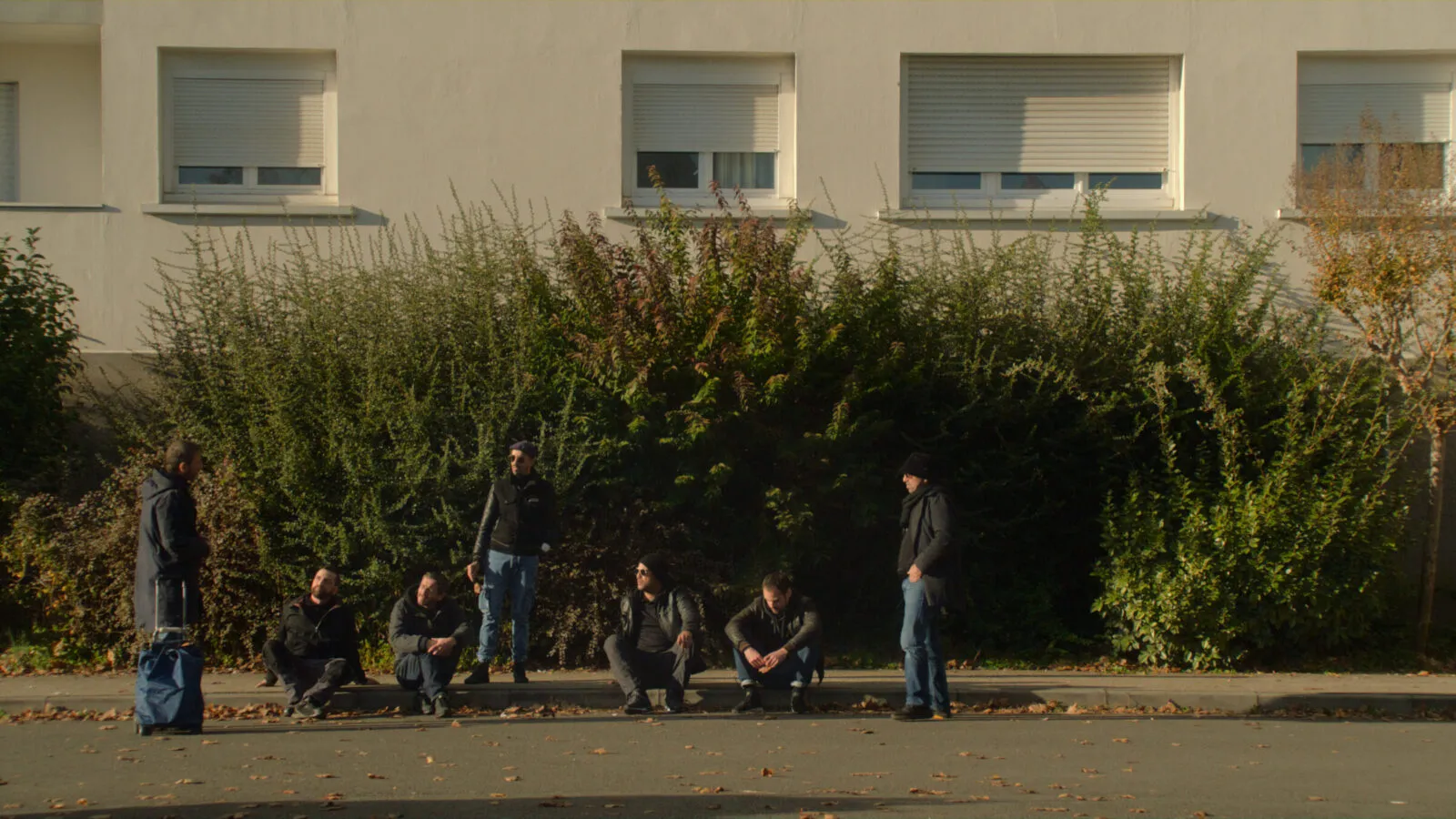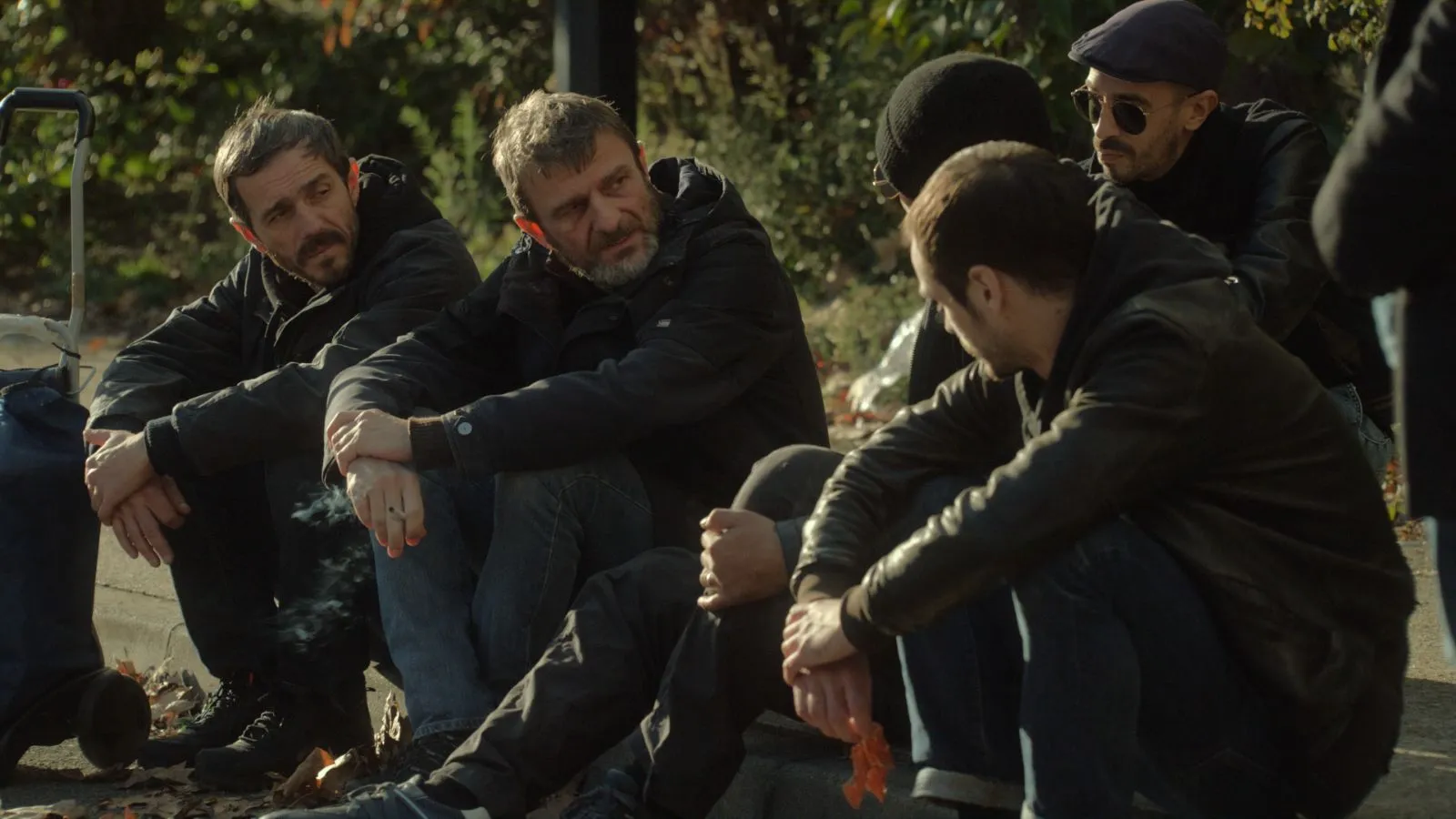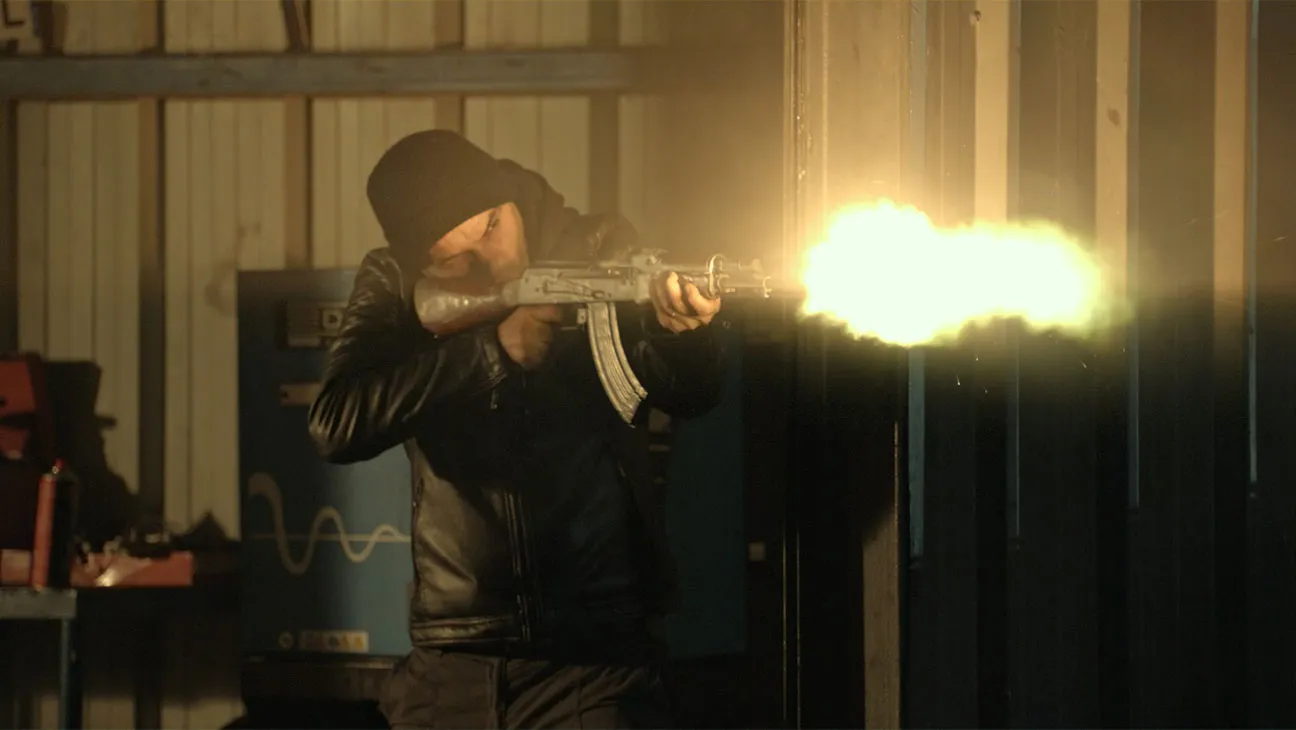Rabah Ameur-Zaïmeche opens The Temple Woods Gang with a quiet urgency, placing us atop a concrete rooftop overlooking the Bois du Temple housing project. The film immediately feels lived-in: sun-bleached façades, pigeon-scattered courtyards and the muted hum of distant traffic. Through a subtle camera move we meet Monsieur Pons, a grieving ex-sniper whose personal loss casts a silent shadow over the story ahead.
From there, the narrative shifts gears into a true-life 2014 heist: a small crew of neighborhood friends—led by the eager Bébé—targets the luggage van of a wealthy Middle Eastern prince. Ameur-Zaïmeche balances vérité-style spontaneity with carefully framed set pieces, making the robbery pulse with authenticity. You sense the director’s art-house roots in every long take and off-beat reaction shot, yet the plot’s kinetic momentum never stalls.
This is no routine thriller. The contrast between adrenaline-fueled action—captured in tense over-the-shoulder shots on the highway—and hushed, almost meditative interludes (a funeral song echoing through stained-glass windows) shows how storytelling can stretch beyond linear convention. I’m reminded of Olivier Assayas’s deft human portraits or François Ozon’s elliptical rhythms, yet Ameur-Zaïmeche carves his own path, grounding spectacle in social reality. The film feels timeless and of its moment, melding visceral thrills with moments of unexpected grace.
The Banlieue as Living Canvas
Les Bois du Temple unfolds against the stark geometry of Clichy-sous-Bois: drab concrete slabs rising over narrow courtyards, interrupted only by scraggly trees and chain-link fences. The film’s opening pan—from a rooftop vantage—captures that austere beauty, inviting comparison to the social realism of Ken Loach or Mathieu Kassovitz’s La Haine. Street signs, parked scooters and the hum of distant traffic serve as unobtrusive world-building, grounding every character choice in a tangible environment.
Ameur-Zaïmeche grew up within arm’s reach of scenes like these, and that personal history radiates through each frame. Shooting in Bordeaux to secure production funds might have risked artificiality, but he shields against that by casting many non-professionals drawn from similar housing estates. Their gestures feel instinctive, their banter unforced—an authenticity that echoes Andrea Arnold’s works when she casts local voices.
Economic exclusion and cultural frustration pulse beneath the narrative. High youth unemployment, cramped apartments and the memory of the 2005 Seine-Saint-Denis riots inform the characters’ drive to escape through one explosive heist. Bébé and his friends aren’t cartoon criminals; they’re products of limited pathways, their dreams as raw as their streetwise humor.
Technically, the choice to intercut wide, observational takes with handheld close-ups reinforces that duality: community tableau versus individual desperation. Sound design favors diegetic ambience—clattering heels on pavement, murmured French-Arabic code-switching—over intrusive score, letting the locale’s rhythms guide the mood. In blending documentary immediacy and staged drama, The Temple Woods Gang stakes its claim as both a social chronicle and a pulse-quickening thriller.
Charting a Heist’s Unfolding Rhythm
The film opens with a slow 360° pan from a rooftop, surveying the concrete sprawl of Bois du Temple before cutting to the removal of a body bag and a hushed funeral. That transition—from detached observer to intimate grief—sets a tone of dual urgency and reflection. I’m reminded of how Alejandro González Iñárritu will juxtapose human vulnerability against sweeping landscapes, yet Ameur-Zaïmeche keeps the focus tightly on raw emotion.
Next comes the heist planning, stitched together through late-night café scenes and furtive phone calls. Bébé emerges as a natural leader, issuing instructions with the casual authority of someone who’s sized up risk by necessity. The camaraderie feels unscripted; you sense the director’s penchant for mixing professional actors with locals, an approach that recalls Andrea Arnold’s love of authenticity in Fish Tank. Weapons are sourced in a gritty montage—close-ups of glinting barrels and the rustle of duffel bags—each cut ratcheting up anticipation.
When the robbery itself erupts, handheld cameras jump into the driver’s seat, ushering us into POV shots that mirror the gang’s exhilaration and dread. The sound mix favors engine roars and clipped dialogue over a swelling score, a choice I admire for its restraint—similar to the disciplined approach in Denis Villeneuve’s quieter moments. The sudden reveal of classified documents amid the suitcases of cash complicates what might have been a straightforward thriller, hinting at geopolitical stakes beyond suburban crime.
Retaliation arrives via the prince’s coolly efficient fixer and a stoic detective named Jim. Each step of the reprisal is measured, unfolding in curt exchanges and shadowy interiors. As bodies fall and alliances fray, the narrative shifts from collective bravado to solitary reckoning. The climactic convergence of Monsieur Pons and the robbers—his sniper’s gaze cutting through twilight—echoes classic Western showdowns, yet here it carries the weight of shared history and personal loss. In those final frames, a single shot reverberates, leaving images of empty streets and abandoned dreams to settle in the mind.
Faces of Fate and Fractured Loyalties
Philippe Petit’s Bébé anchors the film with a raw vulnerability that belies his bold scheme. You sense his yearning to escape economic hardship—dreams of bionic prosthetics for a friend mingle with tense moments when he counts cash under flickering streetlights. Petit walks a tightrope between wide-eyed hope and hardened determination, a blend that recalls Michael Shannon’s understated desperado in Take Shelter but grounded in a distinctly suburban reality.
Surrounding Bébé, the gang feels like an extended family patched together by circumstance. Kenji Meunier and Salim Ameur-Zaïmeche share easy banter that suggests childhood bonds; their offhand jokes—about expired milk or sibling troubles—keep tension from tipping into despair. Kamel Mezdour and Nassim Zazoui add texture with expressions that flicker from giddy triumph to dread when the plan unravels. This mix of first-timers and seasoned actors lends authenticity, echoing Andrea Arnold’s approach in Red Road where community chemistry fuels every beat.
Régis Laroche’s Monsieur Pons emerges as the emotional spine. His soldier’s posture betrays discipline; his tears at the funeral show buried grief. Pons’s quiet interventions—half-glances at the robbers, moments spent cleaning a sniper rifle—carry emotional weight that anchors the chaotic aftermath. Laroche’s performance reminds me of André Gregory’s subtle force in My Dinner with Andre, drawing us into Pons’s inner world with simplicity.
Mohamed Aroussi’s prince plays against type: regal yet distant, he manipulates power through curt phone calls. Lucius Barre’s fixer contrasts with a serene menace—his calm voice delivering kill orders feels chilling, as though reporting a weather update. Slimane Dazi’s detective Jim appears in brief, shadowy scenes; his blank stare and clipped movements stick long after he vanishes from view.
Music here moves beyond background. Annkrist’s haunting funeral song becomes a character in its own right, reverberating through cathedral walls and setting a mournful tone. Later, Sofiane Sadi’s raï rhythms in a nightclub sequence offer a momentary escape—free-form beats that mirror the gang’s fleeting triumph before reality crashes back in. Each performance layer deepens the film’s exploration of communal bonds fraying under pressure.
Sculpting Space and Sound
Ameur-Zaïmeche often lets the camera breathe, favoring long takes that drift through Bois du Temple’s concrete maze. One tracking shot follows Bébé’s gang as they stroll between apartment blocks, the lens keeping pace at shoulder height. That immersive perspective recalls the observational style of Kelly Reichardt’s Certain Women, drawing viewers into the banlieue’s rhythms. By contrast, tight close-ups—sweat beading on a robber’s brow, the prying eye of a sniper scope—turn personal stakes into tactile immediacy.
Production design feels lived-in rather than staged. Interior scenes unfold in stark apartments where peeling paint and plastic-covered furniture speak of modest means. Then there’s the café sequence: mismatched chairs, faded linoleum floors, the jangle of teaspoons against chipped cups. At the heist, suitcases bulge with cash and classified documents, while firearms glint against dull pillars of an industrial underpass. Each prop doubles as a narrative cue, guiding attention without grand gestures.
Silence carries weight here. In the moments before the robbery, ambient sound—distant car horns, a child’s laughter on a balcony—becomes a tension builder. When violence erupts, audio engineers puncture that calm with sudden, jarring bursts: the crack of gunfire, shattering glass, a door slamming. That sonic contrast heightens each shock, making the film’s quieter passages feel all the more fragile.
Music sits squarely within the world. Annkrist’s cathedral-echoing voice and Sofiane Sadi’s raï set emotional beats rather than imposing a score. Editing aligns with their rhythms: shots linger on tear-streaked faces as mournful chords play out; later, quick cuts sync to pulsing drums during a nightclub scene. It’s a testament to how diegetic sound can anchor mood—something I first noticed in Michael Mann’s urban dramas—here applied in a distinctly French milieu that bridges social cinema and thrill-ride spectacle.
Echoes of Power and Loss
The Temple Woods Gang unfolds as a study in disparity. The robbers—Bébé and his friends—are cast firmly among the have-nots, scraping by in concrete towers while the prince lounges in opulent isolation. Their decision to seize suitcases of cash feels less like thrill-seeking than a misguided bid for agency, a commentary on how limited prospects can warp moral compasses.
Fate weaves through the story with quiet insistence. The film’s opening—Pons’s mother carried away in a body bag—hovers like a specter, reminding us that grief underpins every choice. Vengeance simmers slowly, not in explosive set pieces but in tight exchanges and lingering glances, suggesting that retribution can feel as inevitable as dawn.
Yet within that bleakness, community forms a fragile refuge. The gang’s bond mirrors a surrogate family, sharing jokes and cigarettes between planning sessions. Pons, once their neighbor, becomes their wary guardian, his sniper’s vigilance a gesture of both loyalty and sorrow.
Mortality permeates the visual palette: half-empty cafés, rainbow-hued nightclub bulbs casting long shadows, faces etched with fatigue. Music offers the only breath of transcendence—Annkrist’s funeral refrain and Sofiane Sadi’s raï beat momentarily lift the weight of death.
At its core, the film interrogates who wields real power. The prince’s orders ripple across continents with a single phone call, while the banlieue crew confronts brick walls of systemic constraint. It’s a reminder that for many, law and money move in tandem, leaving little room for escape.
The Pulse Between Stillness and Surge
The Temple Woods Gang moves with a deliberate tempo, allowing stillness to accumulate weight before jolting into frenetic episodes. Its measured opening—those lingering shots on Pons’s rooftop vigil—sets a reflective mood that recalls the quiet before the storm in Michael Mann’s Heat. Then, without warning, handheld cameras thrust us into the heist, each swerving frame echoing the gang’s frayed nerves.
That contrast fuels tension. By withholding full details of the robbery plan until moments before execution, the film keeps you alert, leaning forward in your seat. Every exchanged glance feels loaded: Bébé’s furtive smiles, the subtle shift in a friend’s posture. As the prince’s retribution closes in, stakes rise incrementally—phone calls slicing through silence, shadowy figures trailing the culprits.
Yet Ameur-Zaïmeche punctuates darkness with gentle pauses. Café gatherings—coffee cups clinking, half-finished cigarettes—offer glimpses of everyday camaraderie, grounding the narrative in lived experience. I found myself smiling at their offhand banter, a reminder that these are people first, criminals second. When Annkrist’s mournful hymn or Sofiane Sadi’s raï pulses through a scene, time seems to stretch, as if music alone can suspend consequences for a heartbeat.
That rhythm amplifies emotional payoff. You feel genuine empathy for characters whose choices you question; their dreams of escape resonate with anyone who’s ever yearned for more. At the same time, swift bursts of violence land with palpable shock, leaving a lingering unease. It’s a delicate dance—of reflection and rush—that lingers long after the credits roll.
Full Credits
Director: Rabah Ameur-Zaïmeche
Writer: Rabah Ameur-Zaïmeche
Producers: Rabah Ameur-Zaïmeche
Executive Producers: Rabah Ameur-Zaïmeche
Cast: Régis Laroche, Philippe Petit, Marie Loustalot, Kenji Meunier, Salim Ameur-Zaïmeche, Lucius Barre, Mohamed Aroussi, Slimane Dazi, Kamel Mezdour, Nassim Zazoui, Annkrist
Director of Photography (Cinematographer): Pierre-Hubert Martin
Editor: Grégoire Pontécaille
Composers: Annkrist, Sofiane Saïdi
The Review
The Temple Woods Gang
The Temple Woods Gang immerses with raw authenticity, blending intimate portraits of marginalized lives with pulse-quickening heist sequences. Ameur-Zaïmeche’s patient pacing rewards viewers who linger on each textured frame, while immersive sound and potent performances elevate a familiar crime narrative into a resonant social chronicle.
PROS
- Authentic portrayal of banlieue life
- Seamless blend of documentary immediacy and scripted drama
- Standout performances from a mixed amateur–professional cast
- Immersive cinematography and nuanced sound design
- Resonant exploration of social inequality
CONS
- Deliberate pacing may test patience
- Secondary characters receive limited development
- Reliance on diegetic music leaves score sparse
- Sudden tonal shifts can feel disorienting
- Some narrative threads remain unresolved



















































